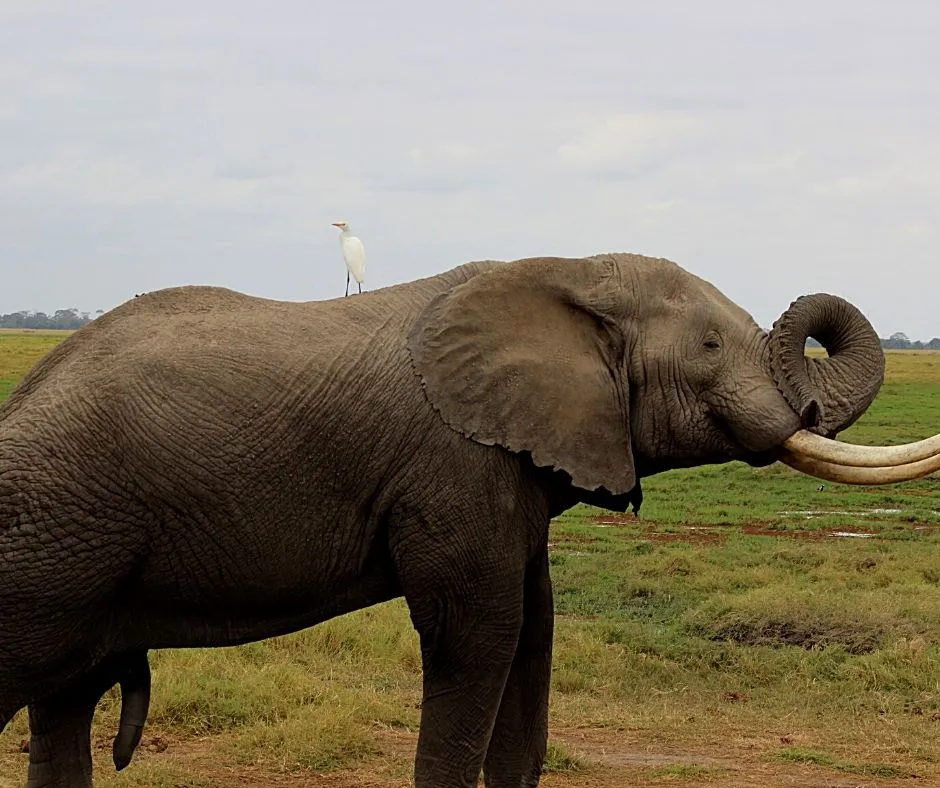How Ethical Animal Tourism Benefits Nature & Wildlife
Ethical Animal Tourism / March 11, 2025 / 7 comments
Imagine standing in the middle of a lush jungle, surrounded by exotic animals in their natural habitats. Sounds like a dream, right? Wildlife tourism has become increasingly popular in recent years, with tourists seeking unique experiences with animals. However, traditional wildlife tourism practices have often harmed animals and the environments they call home. In this article, we’ll explore the benefits of responsible wildlife tourism and provide you with practical tips for being a responsible wildlife tourist. By supporting ethical organizations and educating ourselves and others, we can ensure that wildlife tourism is sustainable and beneficial for both animals and tourists.
As a huge fan of nature, seeing animals in the wild is one of my main reasons for traveling. However, when I started out I thought that all animal rescues and sanctuaries were the same. Since then I’ve learned a lot and am committed to promoting ethical animal tourism around the world so that we can engage in responsible travel and not engage in animal cruelty.
The Problem with Traditional Wildlife Tourism
While wildlife tourism may seem like a perfect way to see animals in their natural habitats, the traditional practices that many companies use can harm the creatures they are showcasing. Often, these animals are taken from their homes and families and placed in unnatural environments or forced to perform for tourists. Travel companies want to make the best travel experiences by keeping animals in captivity. These practices not only negatively impact animals physically and emotionally, but they can also harm the ecosystems they inhabit. Be sure to check out my ten questions to ask before engaging in wildlife tourism to ensure the activity you’re doing is an ethical one. While a captive animal is not always a bad thing (for example, if the agency is rehabbing the animal to re-release into the wild, or keeping the animal safe as it cannot live in the wild after being captive for so long).
The responsible wildlife tourism industry holds many benefits for both animals and tourists. By supporting ethical organizations and visiting sanctuaries that prioritize the well-being of animals over profit, tourists can have the unique experiences they seek while also supporting the conservation of endangered species. These organizations work to protect animals, habitats, and ecosystems, ensuring that they can thrive for generations to come. Additionally, responsible tourism can provide educational opportunities for visitors, helping them to develop a deeper understanding and respect for the natural world. By choosing responsible wildlife tourism, we can create a sustainable future for all involved.

The Benefits of Responsible Wildlife Tourism
Responsible wildlife tourism may seem like a challenge, but it provides numerous benefits for animals and tourists alike. By supporting ethical organizations and visiting sanctuaries that prioritize the wellbeing of animals over profit, tourists can have the unique experiences they seek while also supporting the conservation of endangered species. These organizations work tirelessly to ensure that animals, habitats, and ecosystems are protected and preserved for generations to come. Additionally, responsible tourism can provide educational opportunities for visitors, helping them to develop a deeper understanding and respect for the natural world. By choosing responsible wildlife tourism, we can create a sustainable future for all involved.
1. Increases Community Support for Conservation
Wildlife tourism has offered a number of economic benefits over the last decade, and has played an important role in protecting our natural environment. By creating jobs and dollars for local communities, it encourages people to view wildlife conservation as a valuable commodity rather than just a nuisance or hazard. In Cambodia, ecotourism is already proving to be an effective tool in supporting critically endangered bird species, such as the giant ibis and white-shouldered ibis.
In order for conservation efforts to be successful in any community, there must be strong local support from residents. This can often be difficult to achieve without incentives for individuals to care about nature beyond simply living near it. Nature-based tourism provides a practical way to generate these incentives; when wildlife is seen as something that can bring long-term economic sustainability and prosperity to their hometowns, communities are motivated to do what they can to ensure its survival and protection. Tourism also offers a unique opportunity for people to get up close to nature and learn more about its importance for ecological health and balance. As awareness rises worldwide on the importance of conservation, this type of eco-friendly tourism may continue driving positive change.
Not only does the funding come from the community, but from the government as well. In South Africa, the public entity that manages the national parks SANParks, raises more than 80% of its funding from tourism.

2. Raising Awareness about Our Environment
Raising environmental awareness among tourists is one of the most notable byproducts of tourism. From camping to beach lounging, international travelers can access powerful educational experiences while exploring the natural world. Through a range of interpretive techniques such as tours, brochures, and parks, visitors are exposed to the importance of conservation in order to connect with nature on a deeper level and develop an appreciation for it. For example, whale watching has been shown to increase knowledge about aquatic mammals and may even lead tourists toward taking action when it comes to protecting them. Personally, my trip to Antarctica taught me so much about the impact of climate change and how we all have to do our part. Ultimately, these activities contribute heavily towards inspiring tourists to become increasingly conscious of their individual impact on the environment. Hopefully, we bring these lessons home with us and create change at home.
3. Creates Livelihoods in Local Communities
Beyond changing mindsets, tourism can prevent ecosystem degradation by creating more sustainable livelihoods for local communities. Tourism-related occupations such as guides, cooks, or housekeepers offer sources of income that are far less destructive than logging, slash-and-burn agriculture, quarrying, or illegal hunting. An example of this success can be seen in Rewa in Guyana where the endangered wildlife was threatened due to lack of job security. In 2005, with the introduction of a community-run eco-lodge that employed people from the village as sport fishing guides and boat captains, villagers were able to maintain rainforest-based livelihoods without damaging their environment. This proactive strategy resulted in the protection and rebuilding of vulnerable wildlife species like arapaimas, giant river turtles, and giant otters who otherwise would have been driven away due to poaching.
Tourism is proving to be an important part of protecting delicate ecosystems from destruction while providing alternative economic opportunities for communities living on the brink of poverty. It is therefore important for our global leaders to focus more on developing policies that give preference to eco-friendly solutions like tourism instead of taking a hardline approach towards protectionism. Such regulations should come with incentives for individuals who make investments in small business ventures that help the local economy.
One study found that wildlife tourism is actually FIVE times more lucrative than wildlife exploitation.
4. Aids in Monitoring Ecosystems
The preservation of ecosystems around the world requires consistent monitoring by experts such as park rangers and guards. While these officials play a vital role in upholding the safety of sensitive environments, they are often unable to keep an eye on vast areas on their own. Tourism can serve as an important extra pair of eyes when it comes to conservation efforts, with visitors to natural sites deterring poachers and safeguarding wildlife. Recently, the COVID-19 pandemic has brought attention to this issue as closures of key tourism locations have increased reports of rhino poaching in hot spots for safari excursions.

5. Supports Rebuilding Ecosystems
Not only are the ecosystems monitored and researched, but companies and tourists alike can help support rebuilding efforts.
Ethical animal encounters can even help with ecosystems. You can volunteer with monitoring African-painted dogs to help learn about the animals. You can help sea turtles in Cyprus to help the population return to this area. All of this work guides our research into ecosystems and can aid the recovery of these animals.
There are a number of clean-up programs that happen around the world. The Dive Against Debris program, hosted by PADI, empowers scuba divers around the world to clear litter from our oceans. According to their website, they’ve removed over 2 million pieces of debris and helped over 10,000 entangled animals!
6. Fuels Innovation & Green Tech
Since we have all of these benefits of wildlife tourism, it has been a huge life in environmental innovation. Renewable energy is a core belief of many countries that value their wildlife tourism. Iceland, for example, generates 99% of its electricity from renewable resources. Costa Rica has been steadily increasing their renewable energy and in 2020, 99.78% of electricity was from a renewable source. Countries are seeing the benefit of renewable energy and are making long-lasting changes!
Norwegian Cruise Lines has introduced the first zero-waste cruise ship. Cruises have long been seen as a hugely wasteful way of seeing the world. With the rise in electric vehicle availability, we’re seeing more places have charging stations. This reduces our carbon emissions and helps to clean up our environment.

How to Support Responsible Wildlife Tourism
One of the key ways to ensure responsible wildlife tourism is to support organizations and initiatives that prioritize the well-being of the animals and local communities. When choosing a wildlife tourism experience, look for programs that support local economies and provide opportunities for community involvement in conservation efforts. This not only helps to preserve the environment and protect animal populations but also uplifts and empowers communities that rely on tourism for their livelihoods. Animal experiences that focus on animal entertainment rather than the treatment of animals should be avoided.
Supporting responsible wildlife tourism also provides educational opportunities for tourists, allowing them to learn about the importance of conservation efforts and gain a deeper understanding of the issues facing wildlife and their habitats. Human interactions with individual animals should be minimal and only in the best interest of the animal. By supporting ethical and responsible tourism, we can create meaningful and sustainable experiences for both animals and visitors.
The Future of Wildlife Tourism
Looking ahead, it’s clear that the future of wildlife tourism lies in responsible and sustainable practices. As more people become aware of the impact of their travel choices on the environment and local communities, there is a growing demand for ethical wildlife encounter experiences that prioritize the well-being of wildlife. This shift in mindset has led to an increase in responsible wildlife tourism initiatives and a decline in exploitative practices.
Part of this evolution involves creating more meaningful and immersive experiences for visitors. Rather than simply observing animals from a distance, tourists are seeking out opportunities to learn about conservation efforts and contribute to local initiatives. Responsible tourism operators are responding by offering programs that allow visitors to participate in habitat restoration, wildlife monitoring, and other activities that support conservation efforts.
Another important aspect of the future of wildlife tourism is the use of technology to enhance the visitor experience while minimizing the impact on wildlife. For example, remote cameras and drones can be used to monitor wildlife behavior without disturbing their natural habitats. Virtual reality and augmented reality technologies can also be used to provide visitors with a more immersive and educational experience without the need for physical interaction with animals.

Final Thoughts
Ultimately, the future of wildlife tourism depends on our collective commitment to responsible and sustainable practices. As travelers, we have the power to demand more from the tourism industry and make choices that support the well-being of wildlife and their habitats. By doing so, we can create a brighter future for both animals and humans alike.,
Responsible wildlife tourism is the way forward for both wild animals and tourists. It’s essential to avoid traditional harmful activities, support ethical organizations, and educate ourselves and others on the importance of sustainable wildlife tourism. By doing this, we can ensure that future generations will be able to experience and enjoy wildlife while also supporting conservation efforts. As Jane Goodall once said, “Only if we understand can we care. Only if we care will we help. Only if we help shall all be saved.” Let’s all work together to ensure that responsible wildlife tourism becomes the norm and not just a trend.
Save this post for Later!
About the Author


7 responses to “How Ethical Animal Tourism Benefits Nature & Wildlife”

This is such a well thought out and informative post that I whole heartedly agree with.
On my travels I am often aware of how nature and animals are treated as spectacles and little respect given to the fact that they are wild animals that should never be caged or controlled for our pleasure.
I would rather not go to a place that exploits animals and miss the opportunity to see them, than know I have seen an animal and added to its misery.
Loved reading this article and the timely reminder to check on viable associations that aid animal recovery and release as I travel.
This was a great read and you raised many important questions. Like you, we love viewing wildlife on our trips but are very conscious of making sure our visit is ethical. You’re absolutely right about how important community engagement is – when we were in Costa Rica it was great to see how the locals made sure not to use white light close to the beaches so as not to deter turtles from nesting. We were not allowed to take photos – but simply enjoy the experience. It meant that tourism can really benefit the community as well. And it’s great to hear about how many countries and companies are developing sustainable approach to tourism.

Like you I’m a huge fan of wildlife experiences, in particular dolphin and whale watching. I still feel bad going on these organised boat trips and try to stay as calm and quietly as possible when observing these animals in their natural habitat. I also took part in several beach cleans and eco tours to make sure I can contribute something positive to the nature that I’m aware gets disrupted regardless how careful you are. I’m strongly against any cruelty towards whales and dolphins and refuse to visit the Faroer Islands, Norway and Japan. Would you count this under ethical animal tourism, too or is this a whole new other issue of this highly interesting topic?
Carolin | Solo Travel Story

I’m so glad there is evidence that wildlife tourism is more lucrative than wildlife exploitation—money is a big motivator! Totally agree that the future of wildlife tourism lies in responsible and sustainable practices. I think we’re moving in the right direction, and posts like these will help spread awareness 🙂

What an important topic! I also seek out wildlife opportunities and have learned how to recognize and identify ethical opportunities over the years. My choices have changed as a result. I was hugely impacted by my trips to Costa Rica, Iceland, and a tour of the Amazon (we hauled out more garbage than we created!). Tourists must shun the exploitative activities so that people and governments see the need for responsible eco-tourism.

I also just really want to see animals when I travel, in their natural habitat or at ethical sanctuaries. I do a lot of research to make sure they are good places, which is the least a traveler can do. I liked your point about how certain experiences raise awareness even without that being the marketed point of the experience. I think naturally if people see the animals they are more likely to want to do something to further support their cause in the future as now there’s a personal connection

This is an extremely pertinent subject that focuses on the essential points in the field of animal tourism and ethics.
It is increasingly essential to raise awareness on the subject, especially with regard to tourism that includes wildlife and interaction with it.












Leave a Reply